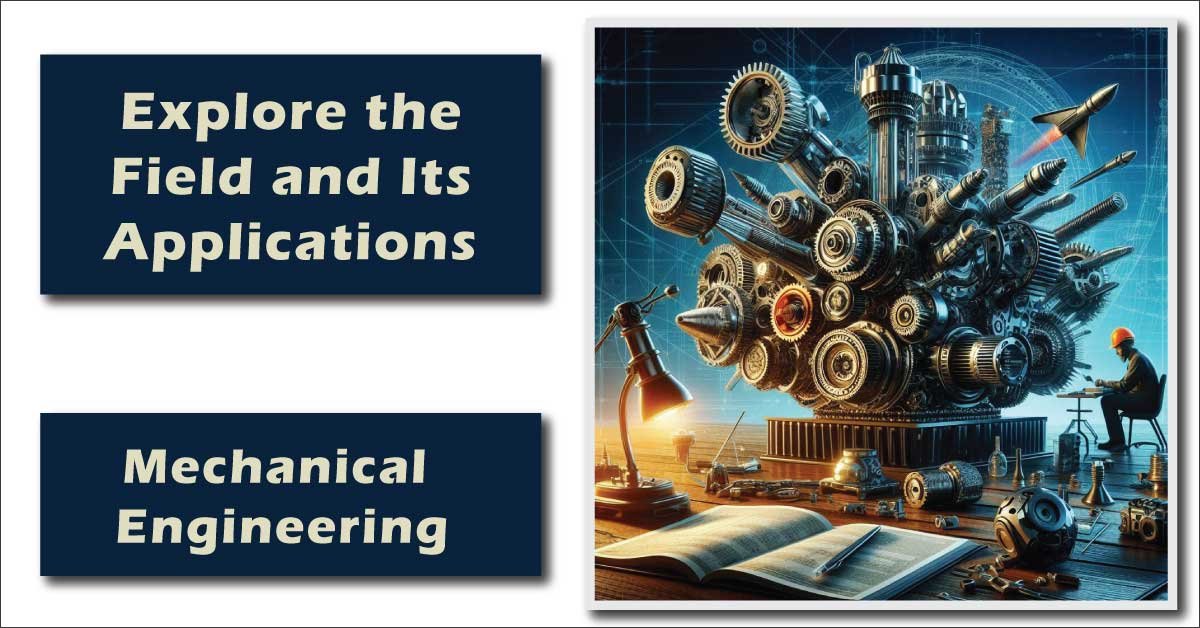Mechanical engineering is a branch of engineering that focuses on the design, analysis, manufacturing, and maintenance of mechanical systems. It combines principles of physics, mathematics, and material science to create machines, tools, engines, and structures that solve real-world problems in industries like automotive, aerospace, and manufacturing.
Introduction to Mechanical Engineering
Mechanical engineering is one of the oldest and most versatile engineering disciplines. It combines principles of physics, mathematics, and materials science to design, analyze, manufacture, and maintain mechanical systems. This field plays a crucial role in various industries, from aerospace and automotive to manufacturing and energy, making it highly relevant in today’s technologically driven world.
The importance of mechanical engineering is underscored by its applications in everyday life. From the vehicles we drive to the appliances we use, mechanical engineering influences nearly every aspect of modern living. The discipline is essential for developing new technologies and improving existing systems, ensuring efficiency, reliability, and sustainability.
History and Evolution of Mechanical Engineering
The origins of mechanical engineering can be traced back to ancient civilizations. Early innovations, such as the wheel and lever, laid the foundation for subsequent advancements. Ancient Greeks and Romans developed rudimentary machines and mechanisms, while inventors like Archimedes introduced principles that would later inform mechanical engineering.
The Industrial Revolution in the 18th and 19th centuries marked a significant turning point for mechanical engineering. This period saw the rise of steam power, enabling mass production and mechanization. Key milestones included the development of the steam engine by James Watt, which transformed industries by providing a reliable power source.
Influential figures, such as Nikola Tesla and Henry Ford, further advanced the field. Tesla’s work on alternating current (AC) power systems revolutionized electrical engineering, while Ford’s introduction of the assembly line drastically changed manufacturing processes. These innovations paved the way for modern mechanical engineering and continue to impact the industry today.
Core Concepts in Mechanical Engineering
At its core, mechanical engineering is built on fundamental principles and theories that govern the behavior of materials and systems. The most essential concepts include:
Mechanics: This branch of physics deals with the behavior of physical bodies when subjected to forces or displacements. It includes both statics, the study of forces in equilibrium, and dynamics, which focuses on forces and their effects on motion.
Thermodynamics: This area explores energy transfer and conversion. It is essential for understanding how heat engines work, the principles of refrigeration, and the efficiency of various energy systems.
Fluid Mechanics: Fluid mechanics examines the behavior of liquids and gases. It is critical for applications such as aerodynamics in automotive and aerospace engineering and hydraulic systems in machinery.
Materials Science: This field studies the properties and behaviors of materials, including metals, polymers, and composites. Understanding material properties is crucial for selecting the right materials for specific applications.
In addition to these core concepts, mechanical engineering includes several important sub-disciplines, such as:
Robotics: This area focuses on the design and application of robots, integrating mechanical, electrical, and software engineering to create automated systems.
Control Systems: Control engineering deals with the behavior of dynamical systems, utilizing feedback loops to ensure systems operate within desired parameters.
Manufacturing Engineering: This discipline involves the processes of converting raw materials into finished products, focusing on optimizing production efficiency and quality.
Modern Applications of Mechanical Engineering
Mechanical engineering has a vast range of applications across various industries, demonstrating its versatility and relevance. Here are some key applications:
1- Automotive Industry: Mechanical engineers play a vital role in designing and improving vehicles. They focus on enhancing safety features, fuel efficiency, and emissions control. Innovations such as electric and hybrid vehicles are reshaping the automotive landscape, requiring engineers to adapt to new technologies.
2- Aerospace Engineering: In aerospace, mechanical engineers design aircraft, spacecraft, and related systems. Their work includes developing propulsion systems, structural designs, and avionics, ensuring safety and efficiency in air travel.
3- Energy Sector: Mechanical engineering is crucial for developing renewable energy technologies, such as wind turbines and solar panels. Engineers in this field work to improve energy conversion processes and develop systems for efficient energy storage and distribution.
4- Biomedical Engineering: This interdisciplinary field combines mechanical engineering principles with medical and biological sciences to design medical devices, prosthetics, and rehabilitation equipment. Innovations in this area improve patient care and enhance the quality of life for individuals with disabilities.
5- Manufacturing: Mechanical engineers are at the forefront of advanced manufacturing technologies, including additive manufacturing (3D printing) and automation. These innovations increase production efficiency and reduce costs while maintaining high-quality standards.
In everyday life, mechanical engineering manifests in countless ways. From household appliances like refrigerators and washing machines to larger systems like heating, ventilation, and air conditioning (HVAC), mechanical engineers create solutions that improve comfort and convenience.
Stay updated with the latest trends in Recent Mechanical Engineering Innovations. Discover groundbreaking advancements that are shaping the industry and enhancing efficiency. Read the full post for insights into how these innovations are transforming mechanical engineering today.

Career Opportunities in Mechanical Engineering
Mechanical engineering offers diverse career paths across various industries. Common job roles include:
1- Mechanical Design Engineer: These professionals focus on creating and testing new products, using CAD software to design components and systems.
2- Manufacturing Engineer: Manufacturing engineers optimize production processes, ensuring efficient use of resources and maintaining quality control.
3- HVAC Engineer: These specialists design heating, ventilation, and air conditioning systems for residential and commercial buildings, ensuring optimal climate control and energy efficiency.
4- Aerospace Engineer: Aerospace engineers work on the design and development of aircraft and spacecraft, focusing on aerodynamics, propulsion, and materials.
5- Robotics Engineer: Robotics engineers design, build, and program robots for various applications, from industrial automation to medical devices.
To succeed in mechanical engineering, individuals must possess strong analytical and problem-solving skills. Proficiency in computer-aided design (CAD) software and familiarity with simulation tools is essential. A solid understanding of mathematics and physics, as well as effective communication and teamwork abilities, are also critical.
Most positions require a bachelor’s degree in mechanical engineering or a related field. Advanced positions may require a master’s degree or professional licensure, such as the Professional Engineer (PE) designation.

Challenges and Future Trends in Mechanical Engineering
Despite its advancements, the field of mechanical engineering faces several challenges, including:
1- Environmental Sustainability: As industries evolve, there is an increasing focus on reducing environmental impact. Mechanical engineers are tasked with developing sustainable practices, such as energy-efficient designs and materials recycling.
2- Resource Depletion: The finite nature of resources necessitates innovative approaches to resource management. Mechanical engineers must design systems that minimize waste and optimize resource utilization.
3- Global Competition: The globalization of engineering has led to increased competition. Engineers must stay ahead by continuously improving skills and adopting new technologies.
Looking ahead, several trends are shaping the future of mechanical engineering:
4 -Additive Manufacturing (3D Printing): This technology enables rapid prototyping and custom manufacturing, allowing engineers to create complex geometries that were previously difficult or impossible to produce.
5- Artificial Intelligence (AI): AI is transforming design processes and automation. Engineers are increasingly using machine learning algorithms to optimize designs and predict maintenance needs.
6- Internet of Things (IoT): IoT technology allows for real-time monitoring of mechanical systems, enabling predictive maintenance and reducing downtime. Engineers are leveraging IoT to create smarter, more efficient systems.
7- Sustainable Energy Solutions: The shift towards renewable energy sources is driving innovation in energy systems. Mechanical engineers are developing technologies that harness wind, solar, and other renewable resources while improving energy storage and distribution.
Delve into the fascinating world of How Do Mechanical Arms Work. This post explains the mechanics behind these incredible machines, from their components to their applications. Explore the full article to understand the technology driving modern automation.
Mechanical Engineering Education and Resources
Aspiring mechanical engineers have access to a wealth of educational resources. Many top universities offer robust mechanical engineering programs, providing students with hands-on experience and exposure to cutting-edge research. Some renowned institutions include:
Massachusetts Institute of Technology (MIT): Known for its innovative approach to engineering education, MIT offers comprehensive mechanical engineering programs with opportunities for research and interdisciplinary collaboration.
Stanford University: Stanford’s mechanical engineering program emphasizes entrepreneurship and innovation, preparing students to tackle real-world challenges.
ETH Zurich: This Swiss university is recognized for its strong engineering programs, combining theoretical foundations with practical applications.
In addition to formal education, numerous resources are available for self-learning and professional development:
Textbooks: Key texts, such as “Mechanical Engineering Design” by Joseph E. Shigley and “Fundamentals of Thermodynamics” by Richard E. Sonntag, provide valuable insights into core concepts and principles.
Online Courses: Platforms like Coursera, edX, and Udacity offer courses on various mechanical engineering topics, allowing learners to enhance their knowledge and skills.
Professional Organizations: Joining organizations like the American Society of Mechanical Engineers (ASME) provides access to networking opportunities, resources, and industry publications.
Discover the Top 7 Software for Mechanical Engineering in our comprehensive guide for professionals. From design to analysis, find out which tools can enhance your workflow and boost productivity. Read the full post for insights on optimizing your engineering projects.

Case Studies and Success Stories in Mechanical Engineering
Examining case studies and success stories from the field of mechanical engineering highlights its impact on society. For instance, NASA’s development of the Mars Rover showcases the culmination of mechanical engineering innovations in robotics, materials science, and systems engineering. The successful landing of the rover on Mars has enabled scientists to conduct groundbreaking research on the planet’s geology and atmosphere.
Another inspiring success story is that of Elon Musk, the CEO of Tesla and SpaceX. His vision for electric vehicles and reusable rocket technology demonstrates the transformative potential of mechanical engineering. Tesla’s advancements in battery technology and automation have not only revolutionized the automotive industry but also set new standards for sustainability.
These case studies serve as inspiration for aspiring engineers, illustrating the diverse opportunities available in the field and the positive impact they can have on the world.
Conclusion
In conclusion, mechanical engineering is a dynamic and multifaceted discipline that continues to evolve in response to technological advancements and societal needs. From its historical roots to modern applications and future trends, mechanical engineering plays a vital role in shaping industries and improving the quality of life.
As we look ahead, the challenges of sustainability, resource management, and global competition will require innovative solutions from mechanical engineers. By embracing emerging technologies and fostering collaboration across disciplines, the future of mechanical engineering holds immense potential for addressing complex global issues and driving progress in various sectors.
The commitment to advancing human knowledge and capabilities through mechanical engineering will undoubtedly pave the way for a brighter, more sustainable future for generations to come. Aspiring engineers are encouraged to explore this exciting field, as their contributions will be instrumental in building a better world.
Transform your workspace with Mechanical Workshop Layout Ideas for Maximum Efficiency. This post offers creative solutions to optimize your workshop design for productivity and safety. Explore the full article for practical tips to enhance your mechanical workshop’s layout.

